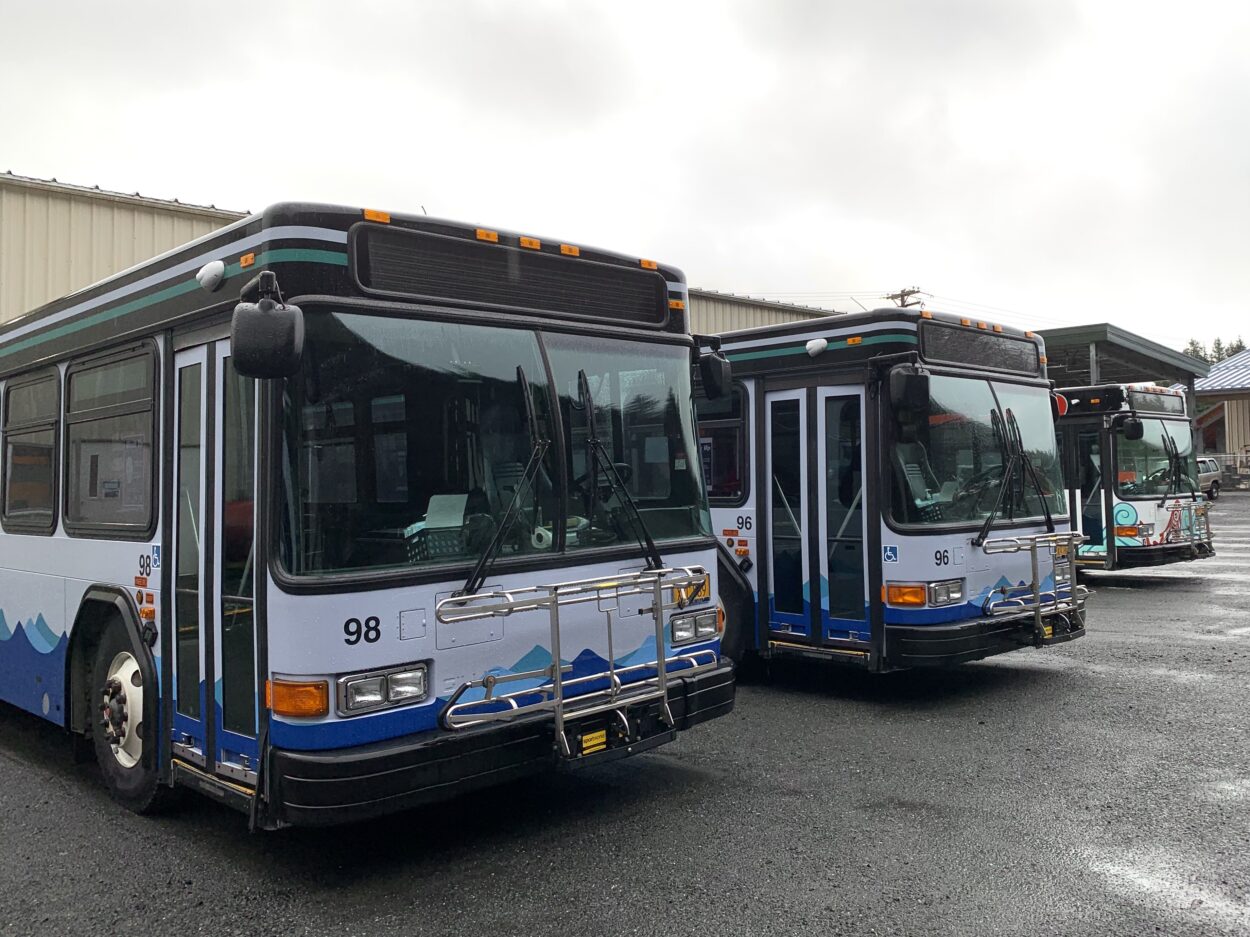
Ketchikan buses sit parked outside the borough maintenance facility. (Eric Stone/KRBD)
Ketchikan and Metlakatla both received federal money to get electric buses on the road. In Metlakatla, the bus will run to the ferry terminal 14 miles out of town – a first for the community. In Ketchikan, three electric buses could be on the road by 2024.
Audio PlayerGas was $5.55 a gallon last time Keolani Booth checked, and that’s an improvement.
With prices like that, he said it’s getting even harder to make the 28-mile round trip to Metlakatla’s ferry terminal.
“It’s a hardship — we’ve got 14 miles of road out here,” Booth said. “There’s a lot of people that are on foot, that don’t have cars.”
He said a $400,000 Federal Transit Administration grant for the purchase of an electric bus could change that.
Booth sits on Metlakatla’s governing Tribal Council and the board chair of the local power utility. He said there’s never been a bus dedicated to running to the terminal. Many people have to either walk or ask for rides.
Booth said the bus will be “virtually” free.
“You know, we have a lot of people that are on a fixed income,(a) big portion of the community’s elderly,” he explained. “So we take all those things, we consider all of that and try to fit within those people’s budgets.”
Metlakatla Mayor Albert Smith said he isn’t quite sure when the bus is due to arrive. Metlakatla Indian Community is still in the process of claiming the grant money.
“But we’re excited and we’re getting ready,” Smith said.
Two ferries come to Metlakatla each day. In between trips to the terminal, Booth noted that the bus will help the community’s elders get around.
In Ketchikan, a $4.2 million grant will put three electric buses on the road – Transit Director Kyan Reeve said they’ll probably hit the streets in late 2024.
Ketchikan’s grant was funded by the FTA. The money was also flagged for the “community use of hydropower,” according to a news release from Sen. Lisa Murkowksi’s office.
The new buses will come from the same manufacturer as the borough’s current diesel buses. Reeve said that could prevent a lot of problems — similar to those reported when Juneau’s buses switched to electric.
“What they (Juneau) did is (they) introduced a bus that was built from the ground up, that was very new, that didn’t use any of the same parts as their current fleet, and also didn’t have a track record,” according to Reeve. “So that was a very young bus company that developed their bus, and so the issues weren’t all with the drive systems, the battery systems — those type of things. A lot of the issues were just simple bus issues.”
Ketchikan’s buses are from the manufacturer Gillig. The transit department’s manager, Stephanie Bushong, said that 80% of the parts in the new buses are identical to current buses.
She said that will be a cost-saver even for simple repairs like windshield wipers.
She explained the grant also covers the charging equipment for the buses.
“We’re going to have to upgrade transformers, there’s a bunch of work that will need to be done in that realm,” Bushong said.
Reeve said that the buses’ batteries have twice as much power as other electric buses. He thinks they’ll do best on Ketchikan’s urban and hilly routes.
Neither Ketchikan or Metlakatla have yet placed orders for the new buses. In Ketchikan, Reeve said that a little more work still has to be done to determine that the buses are the right choices for the community.
Raegan Miller is a Report for America corps member for KRBD. Your donation to match our RFA grant helps keep her writing stories like this one. Please consider making a tax-deductible contribution at KRBD.org/donate.





